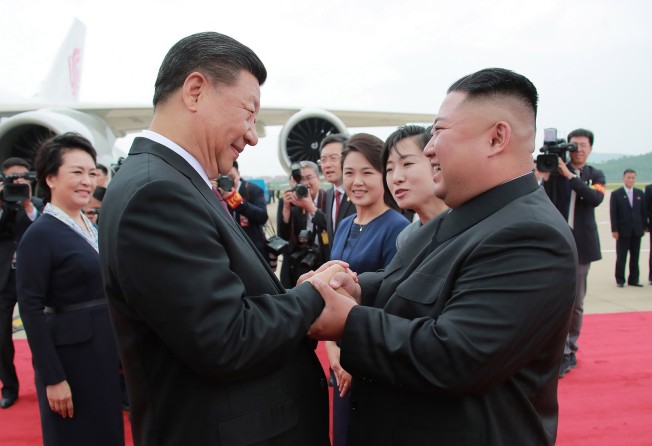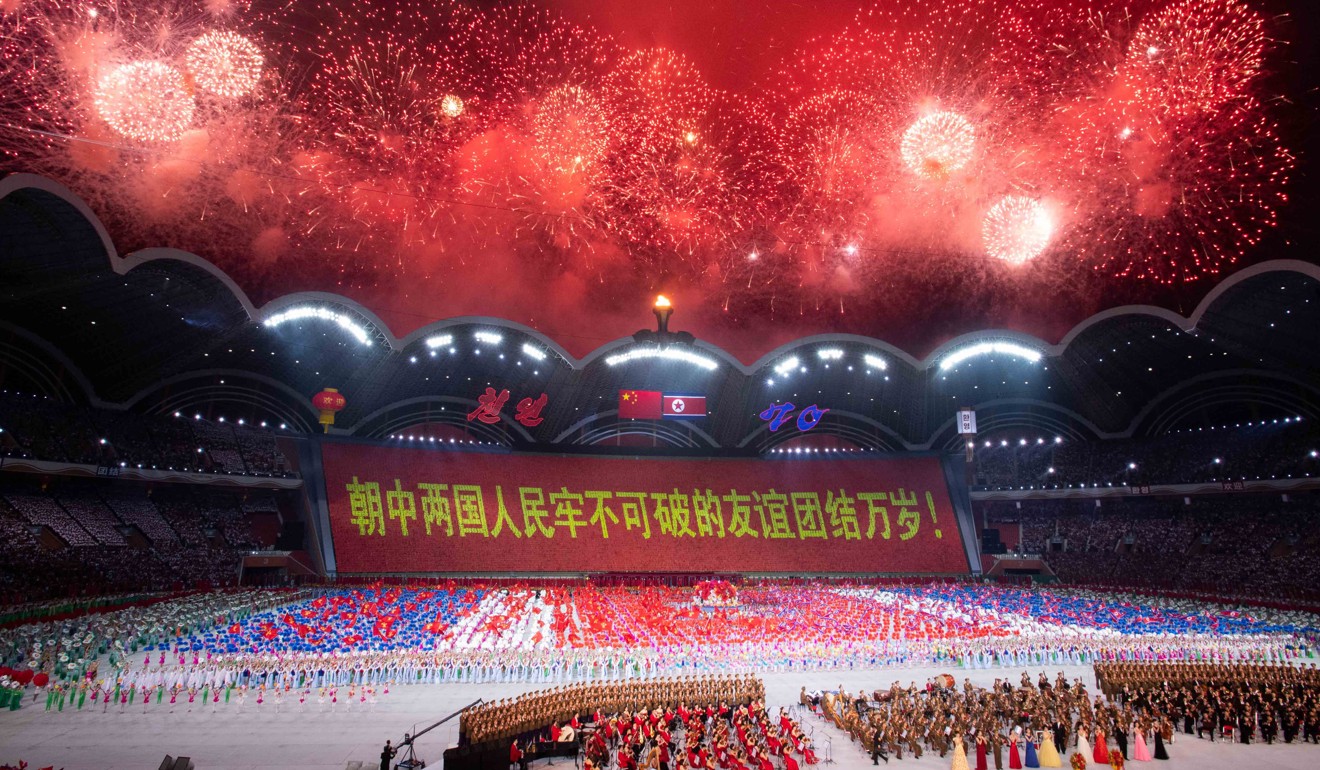Was Xi Jinping’s state visit to North Korea a reminder to the US that ‘big brother’ is always watching?
- Chinese president makes a big play of his close friendship with Kim Jong-un during two-day state visit to Pyongyang
- Trip sends a strong message to Washington that when it comes to the denuclearisation of the Korean peninsula, Beijing is still very much involved

Mao Zedong once described the relationship between China and North Korea being “as close as lips and teeth”, while Pyongyang has often described itself as Beijing’s “little brother”. Brotherly love aside, the relationship between the two countries has not always been smooth, but there were no signs of any turbulence during Xi Jinping’s visit to Pyongyang this week.
The Chinese president’s trip came at a time of stagnant dialogue between Pyongyang and the United States (and South Korea). While the “war of words” between Washington and Pyongyang has not been resurrected, the latter’s frustrations at Washington’s refusal to lift sanctions have been made clear. The summits between North Korean leader Kim Jong-un and US President Donald Trump, in Singapore and Hanoi, achieved little progress on the denuclearisation of the Korean peninsula, and Seoul’s role as a mediator has reduced in potency. Could Xi’s visit catalyse renewed dialogue?
Following Kim’s three trips to China in 2018, Xi’s state visit to Pyongyang was timely, marking the 70th anniversary of Sino-North Korean diplomatic relations. It was preceded by an article written by Xi, in North Korean party newspaper Rodong Sinmun, in which the Chinese leader pledged Beijing’s “firm support” for Pyongyang’s “new strategic line … no matter how the international situation changes”.
Even before the visit commenced, this was a stark warning to the US: should the tides turn against Pyongyang, Beijing would not hesitate to assist its little brother.
China is caught in a balancing act between maintaining its desires to be seen internationally as a responsible power and ensuring a stable North Korea. We should not expect its support for Pyongyang, both humanitarian and economic, to abate. By giving his backing to Kim’s “new strategic line”, which focuses on strengthening the economy, Xi hopes to dampen Kim’s nuclear ambitions and provocations.
While Beijing’s priority remains peace and stability on the Korean peninsula and, ideally, a non-nuclear North Korea, Pyongyang benefits immensely from such verbal assurances. Kim gets to keep his nuclear weapons, at least for now, while receiving economic assistance from Beijing. It is a win-win.
As expected, Xi’s visit was loaded with symbolism of the two states’ long relationship. The two leaders looked much like a US presidential candidate and his running mate as they attended a mass games performance. Both Chinese and North Korean state media emphasised the friendship on show.
Xinhua highlighted how the visit would “consolidate the friendship between China and the DPRK [Democratic People’s Republic of Korea]” and “promote the process of political settlement of the Korean peninsula issue”. Xi is reported to have asserted China’s willingness “to provide assistance within its capacity for the DPRK to address its legitimate security and development concerns” and “strengthen coordination and cooperation with the DPRK as well as other relevant parties”.

So is China stepping in to mediate the US-DPRK dialogue, following the arduous and somewhat unsuccessful attempts by South Korea?
Xi’s thanks for North Korea’s “active measures to avoid tensions” over the past year and affirmation of China’s willingness to play a “constructive role in achieving denuclearisation of the Korean peninsula” would have been positive words for Kim to hear. But for all Xi’s praise for Pyongyang’s efforts to “control” the situation on the peninsula, North Korea remains a nuclear state in all but name.
Just as the US has insisted on the complete, verifiable and irreversible dismantlement of Pyongyang’s nuclear arsenal, so too has Pyongyang refused to reciprocate, by making any active concessions on its nuclear programme.
Xi said North Korea “has not received positive responses from the party concerned”. Undertones of “my enemy’s enemy is my friend” shine through, given the turbulent nature of current state of US-China relations.
Another clear message from Beijing to Washington arises. For those who think that North Korea’s denuclearisation is simply an issue to be resolved by Trump and Kim, Xi disagrees. Beijing should not be ignored. With the Chinese and US leaders set to meet at the G20 summit in Osaka next week could Xi give Trump a better idea of Kim’s motivation than the US president has been able to deduce after two summits with the head of the restive state?
Chinese state media said Kim affirmed that North Korea would “move forward side by side” with China and foster a “new chapter of friendship and cooperation between the two countries”.
What that new chapter will involve, only time will tell. While Xi may not be able to convince Kim to abandon his nuclear ambitions, his visit is most definitely a sign that the US needs to maintain dialogue with North Korea, not least by engaging Washington’s ally, Seoul.
Otherwise, the cycle of stagnation will only lengthen, as time goes by.
Edward Howell is an ESRC scholar in international relations at the University of Oxford, specialising in East Asia and the Korean peninsula